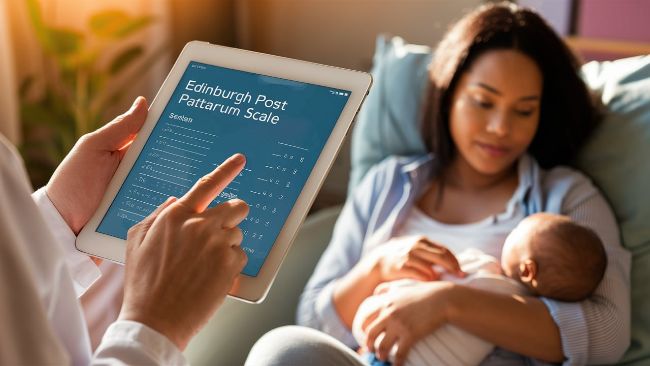There’s an old saying: “It takes a village to raise a child.” But in our modern world, many new mothers find themselves home from the hospital, sleep-deprived, and utterly alone. The “village” is often nowhere to be found. The pressure to “bounce back” is immense, and the reality of physical recovery and emotional upheaval is a silent, isolating struggle.
For a mother battling the fog of postpartum depression (PPD), this isolation can be a crushing weight.
But what if you could hire your own personal, professional “village”? What if you could have a wise, compassionate, and experienced guide walk through your door, ready not just to help with the baby, but to focus entirely on you?
This is the role of a postpartum doula.
Often misunderstood, a postpartum doula is not a nanny or a baby nurse. She is a trained professional who provides emotional, physical, and practical support to a new family after childbirth. Her focus is on “mothering the mother,” allowing you the space you need to heal your body, bond with your baby, and protect your mental health.
In this guide, we’ll explore the profound and practical ways a postpartum doula can be a lifeline during one of the most vulnerable times in your life.
What Exactly IS a Postpartum Doula?
The word “doula” comes from the ancient Greek word for “a woman who serves.” A postpartum doula’s service is dedicated to the well-being of the mother and her family in the “fourth trimester”—the first three months after birth.
Her primary goal is to ensure the new mother feels supported, rested, and confident. She does this by filling the gaps that modern society has left wide open.
What a Postpartum Doula Is NOT:
To understand her role, it’s helpful to know what she isn’t.
- She is not a medical professional. She doesn’t give medical advice, make diagnoses, or replace your doctor or midwife.
- She is not a baby nurse. While she is skilled in newborn care, her primary focus is the mother’s recovery, not 24/7 sole care of the infant.
- She is not a housekeeper. While she does light household tasks to make your life easier, her purpose is not deep cleaning.
- She is not a therapist. She is a trained emotional support professional, but she does not provide clinical therapy. However, she is a vital part of your mental health support team.
The Five Pillars of Postpartum Doula Support
So, what does a doula actually do? Her support can be broken down into five essential pillars that work together to create a nurturing environment for healing.
[Use the “Columns” block to arrange the following 5 pillars in a visually appealing way, perhaps a 2×2 grid with one below.]
Pillar 1: Emotional and Mental Support

This is perhaps the most crucial role a doula plays, especially for a mother struggling with PPD. She provides a consistent, non-judgmental presence.
- Active Listening: She creates a safe space for you to talk about your birth experience, your fears, your frustrations, and your feelings—without offering unsolicited advice or judgment.
- Validation: When you say, “This is so much harder than I expected,” she replies, “It is incredibly hard. You are doing a great job in a difficult situation.” This validation is a powerful antidote to guilt.
- Screening and Referrals: A trained doula is knowledgeable about the signs of PPD and other perinatal mood disorders. She can help you recognize the symptoms in yourself and connect you with qualified therapists or support groups.
- Holding Hope: On days when you feel hopeless, she holds the hope for you. She has seen other mothers navigate this and come out the other side, and her calm confidence can be a beacon.
Pillar 2: Physical Recovery Support
Your body has just been through a major medical event. A doula ensures you have the space to physically heal.
- Prioritizing Rest: Her primary goal is often to get you to sleep. She will care for the baby so you can take a long, uninterrupted nap, which is one of the most powerful medicines for your body and brain.
- Nourishment: She can prepare nutrient-dense meals and snacks, keep your water bottle full, and make you a soothing cup of tea. Proper nutrition and hydration are essential for healing.
- Comfort Measures: She can prepare a sitz bath, bring you pillows, or simply ensure you can sit and rest comfortably while she handles other tasks.
Pillar 3: Practical, Hands-On Support
This is where a doula’s help feels like magic. She quietly lowers the mountain of household stress that can feel so overwhelming. While you are resting or bonding with your baby, she might be:
- Doing a load of baby laundry.
- Washing dishes and sterilizing bottles.
- Tidying the kitchen or living room.
- Running a small errand.
- Organizing the nursery.
This practical support frees up your mental energy from a never-ending to-do list, allowing you to focus on your recovery.
Pillar 4: Newborn Care and Education
A doula doesn’t just take over; she empowers you. She provides evidence-based information and hands-on guidance to build your confidence as a new parent. This can include:
- Teaching soothing techniques (swaddling, baby-wearing).
- Guidance on newborn cues (hunger, sleepiness).
- Breastfeeding or bottle-feeding support and troubleshooting.
- Demonstrating baby’s first bath.
When you feel more competent in caring for your baby, your anxiety can decrease significantly.
Pillar 5: Partner and Family Support
A postpartum doula supports the entire family unit.
- For Partners: She can model how to support the mother, suggest ways for the partner to bond with the baby, and provide a listening ear for their own anxieties and stress.
- For Siblings: If you have older children, she can help them adjust to the new baby, freeing you up to have some one-on-one time with them.
- Facilitating Communication: She can help you and your partner find the language to talk about your needs during a stressful time.
A Day in the Life with a Postpartum Doula
“I hired a doula after my PPD diagnosis felt like a death sentence. The first day she came, I was a wreck. I hadn’t showered, the house was a disaster, and I was crying. She didn’t even flinch. She just said, ‘You look like a new mother. Why don’t you go lie down? I’ve got this.’
“While I slept for two solid hours, she made a big batch of oatmeal, washed all the bottles, and tidied the living room. When I woke up, she handed me a warm mug of tea and just sat with me while I talked. She didn’t try to fix me. She just listened. For the first time in weeks, I felt a flicker of peace. She didn’t cure my PPD, but she created the space where I could heal.”
— Anonymous Mom
How a Doula Becomes Part of Your PPD Treatment Team
A doula is a non-clinical professional, but her role is profoundly therapeutic. She directly counteracts the main risk factors that can cause or worsen postpartum depression.
- She Fights Isolation: Her presence is a consistent, compassionate connection to the outside world.
- She Fights Sleep Deprivation: By prioritizing your rest, she helps your brain heal. Sleep is a cornerstone of any mental health treatment plan.
- She Fights Overwhelm: By lowering your practical and mental load, she reduces the stress hormone cortisol, which can exacerbate depression and anxiety.
- She Fights Incompetence: By building your skills and confidence, she helps dismantle the negative self-talk that tells you you’re a “bad mom.”
She becomes the logistical and emotional support that allows you to fully engage with your clinical treatment, whether it’s therapy, medication, or both.
The Practicalities: Finding and Funding a Doula

“This sounds amazing, but how do I find one and how can I afford it?”
How to Find a Doula:
- Professional Organizations: The websites for DONA International and CAPPA are excellent places to start. They have searchable directories of certified doulas in your area.
- Local Referrals: Ask your OB-GYN, midwife, or local parenting groups for recommendations.
What to Ask in an Interview:
- What is your training and certification?
- What is your philosophy on postpartum support?
- Do you have experience supporting mothers with PPD?
- What specific services are included in your packages?
- Can I speak to a few past clients?
How to Handle the Cost:
The cost of a postpartum doula can be a significant barrier. Here are some creative ways to make it more accessible:
- Add it to Your Baby Registry: Many doulas offer gift certificates. Instead of another baby gadget, ask friends and family to contribute to your “postpartum wellness fund.”
- HSA/FSA Accounts: Some Health Savings Accounts or Flexible Spending Accounts may cover doula services with a letter of medical necessity from your doctor.
- Shorter Packages: You don’t need a doula for 40 hours a week. Even one 4-hour shift a week for the first 6-8 weeks can be a game-changer.
Frequently Asked Questions (FAQ)
Q1: What’s the difference between a postpartum doula and a baby nurse?
A baby nurse’s sole focus is the infant. They often work overnight to provide 24/7 care so parents can sleep. A postpartum doula’s focus is the mother and the family unit. She cares for the baby so that the mother can rest and recover.
Q2: When should I hire a postpartum doula?
It’s ideal to interview and hire a doula during your second or third trimester. This gives you time to find a good fit and get a contract in place. However, you can also hire a doula after the baby is born if you realize you need the support.
Q3: How long do you typically use a postpartum doula?
This varies greatly. Some families use a doula for the first two weeks. Others find support for the entire “fourth trimester” (12 weeks) to be most beneficial.
An Investment in Your Well-Being
Hiring a postpartum doula is not a luxury; it is a strategic investment in your physical and mental health. In a world that focuses so much on the baby, a doula is a powerful statement that the mother matters, too.
She provides the practical support of a helping hand and the emotional support of a compassionate heart, creating the calm, nurturing environment your body and mind need to recover and heal. She is the modern village, all in one person.
Disclaimer: This article is for informational purposes only and does not constitute medical advice. A postpartum doula is a valuable part of a support team but is not a substitute for medical or psychological care from a licensed professional.
